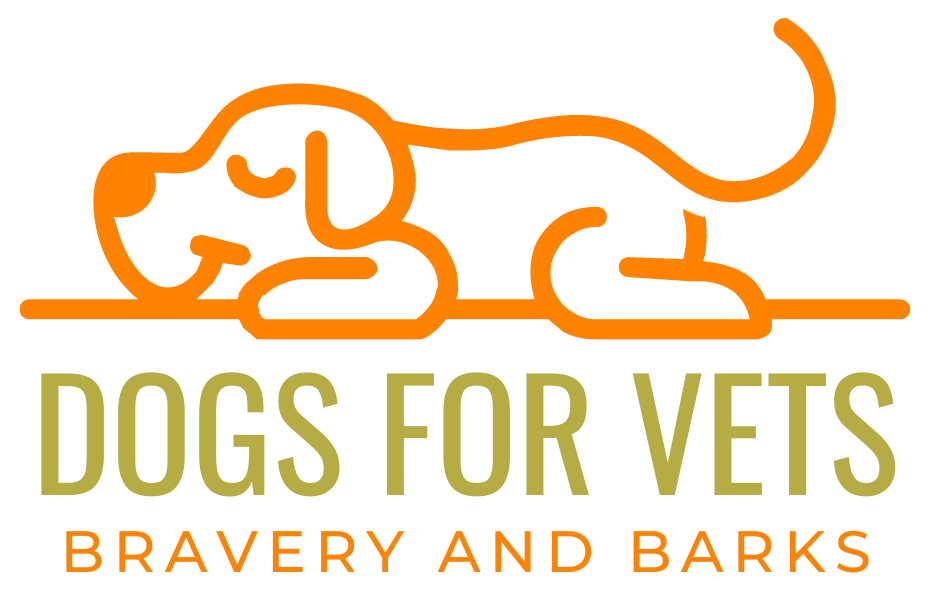This post may contain ads and affiliate links and we may earn a small commission when you click on the links at no additional cost to you. As an Amazon Affiliate, we earn from qualifying purchases. You can read our full disclaimer here.
Socializing Tips for Golden Retrievers: The Ultimate Playbook
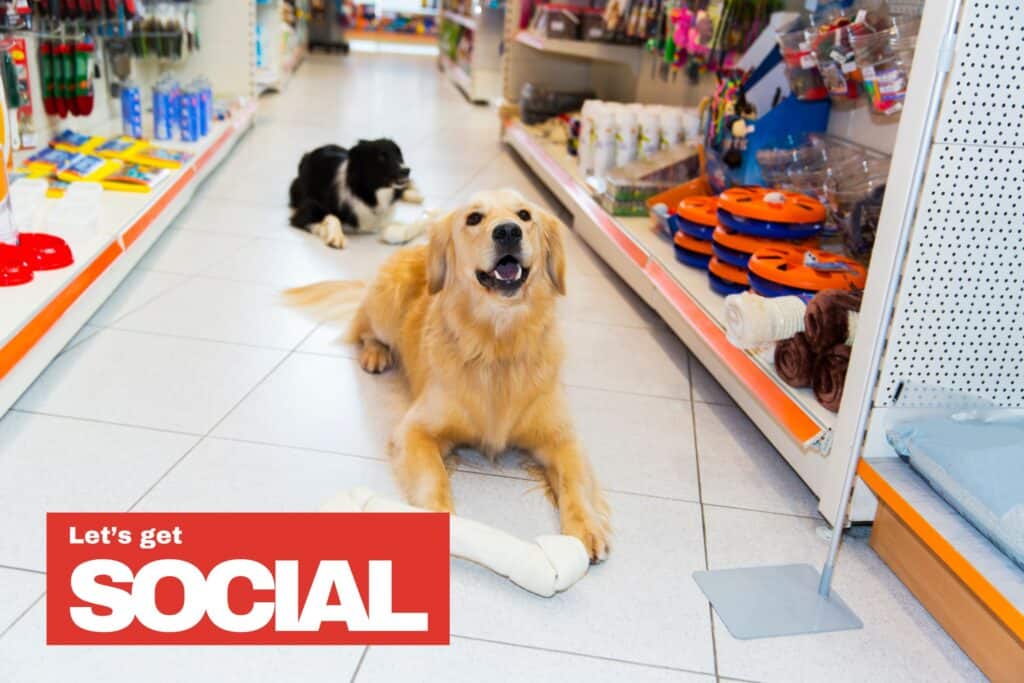
Discovering effective socializing tips for Golden Retrievers is essential, especially if you’re a new owner, an experienced pet enthusiast, or currently fostering one of these amiable dogs.
Renowned for their friendly nature, Golden Retrievers thrive with appropriate socialization, which is crucial in bringing out their best traits and ensuring they grow into well-adjusted, sociable adults.
Why Socializing Tips for Golden Retrievers
Socialization is not just about playing with other dogs. It’s a crucial part of your Golden Retriever’s development. Early and effective socialization shapes them into well-behaved, confident adult dogs. It helps them navigate various situations, from meeting new people to exploring different environments.
Key Takeaways
In this guide, we’ll explore:
- The Basics: Understanding the social needs of Golden Retrievers.
- Age Matters: Tailoring socialization practices for puppies and adults.
- Meeting New Friends: Tips for interactions with dogs and humans.
- Public Adventures: Successfully taking your Golden Retriever out in public.
By focusing on these areas, we aim to provide practical and easy-to-follow socializing tips for Golden Retrievers. Let’s create a positive and enjoyable experience for you and your furry friend!
Understanding Golden Retrievers
Breed Characteristics: Key to Socializing Tips for Golden Retrievers
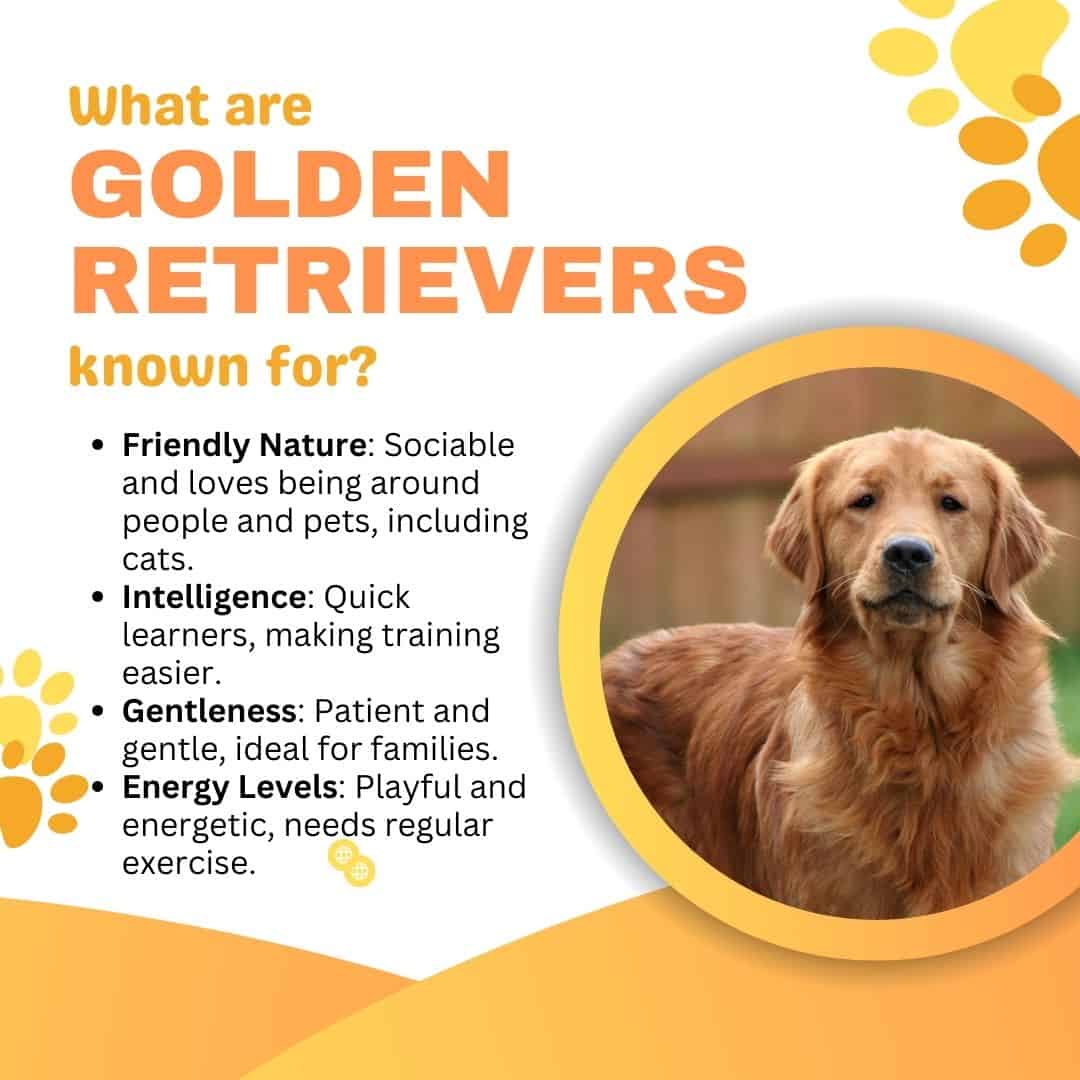
When exploring socializing tips for Golden Retrievers, it’s vital to start by understanding their breed characteristics. Golden Retrievers are medium to large dogs, known for their lush, golden coats and expressive eyes.
They have a sturdy build and are often characterized by their boundless energy and agility.
This breed’s physical attributes not only make them excellent companions for outdoor activities but also play a significant role in how they socialize and interact with their surroundings.
Behavioral Traits and Temperament
Golden Retrievers are known for their:
- Friendly Nature: They are inherently sociable, eager to please, and enjoy being around people and other pets, even cats.
- Intelligence: This breed is known for its quick learning ability, making training and socialization a smoother process.
- Gentleness: Golden Retrievers are typically gentle and patient, traits that make them great family pets and companions.
- Energy Levels: They are energetic and playful, requiring regular exercise and mental stimulation to keep them happy.
Understanding these traits is crucial for tailoring your approach to socialization.
By recognizing their natural tendencies, you can better guide your Golden Retriever through various social scenarios, ensuring they grow into well-rounded and well-mannered dogs.
The Importance of Socializing Tips for Golden Retrievers
Why Socializing Your Golden Retriever Matters
Socializing tips for Golden Retrievers aren’t just helpful hints; they’re crucial for your furry friend’s growth and happiness. Think of socialization as a key ingredient in raising a well-behaved, confident Golden Retriever.
It’s not just about making them friendlier; it’s about helping them become well-rounded companions.
Perks of Getting Your Golden Retriever Out and About
So, why bother with socialization? Here’s the scoop:
- Making Friends: Regular socializing means your Golden Retriever will be more at ease around other pets and people.
- Chill Vibes: It also cuts down on their nerves in new places or situations.
- Good Doggo Behavior: Dogs that get out more tend to have fewer behavioral issues. No one wants a jumpy or overly timid pooch.
How Socialization Shapes Your Dog
Now, let’s talk about the impact on your dog’s personality:
- Happy, Well-Adjusted Adults: Pups that mix and mingle grow up into more adaptable adult dogs.
- Smooth Interactions: Socializing teaches your Golden how to read and respond to social signals from both dogs and humans.
- Happy and Healthy: Getting out and about isn’t just fun; it’s a big boost to your dog’s emotional wellbeing.
So, by integrating these socializing tips into your Golden Retriever’s life, you’re setting them up for a lifetime of positive experiences. It’s all about making their world a happier, friendlier place.
Socialization for Different Age Groups
Navigating the socialization process with Golden Retrievers requires a tailored approach based on their age. The experiences and techniques suitable for puppies differ significantly from those for adult dogs.
Understanding these nuances is key to effective socialization at every stage of your dog’s life.
A. Puppies: Laying the Foundation
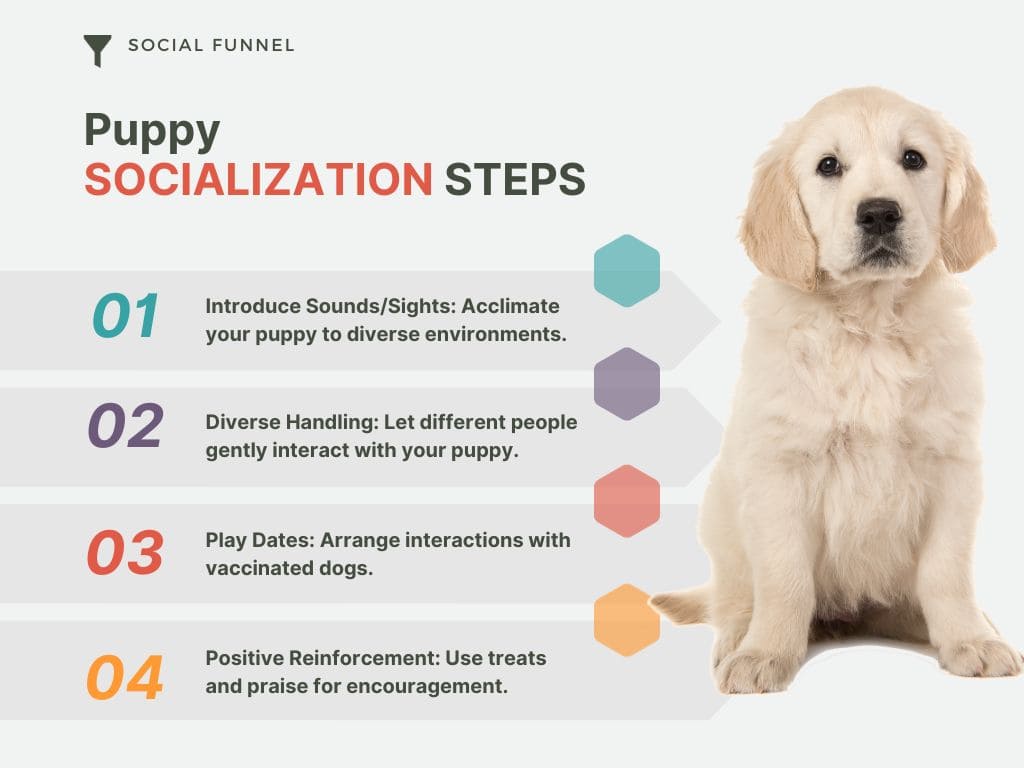
During the puppy stage, socialization is all about setting a strong foundation for future interactions. This period is critical for shaping their responses to the world around them.
- Early Weeks Matter: The period between 3 to 14 weeks is pivotal for puppies. This is when they are most receptive to new experiences and learn rapidly about their environment, making it the ideal time to introduce them to various stimuli.
- Varied Experiences: It’s essential to expose them to a wide range of people, dogs, environments, and sounds during this time. A diverse range of experiences helps in building their confidence and adaptability.
- Gentle Introduction: Ensure that these early experiences are positive and non-threatening. It’s crucial to avoid overwhelming the puppy, as negative experiences can have long-lasting effects on their temperament.
B. Adult Dogs: Building on the Basics
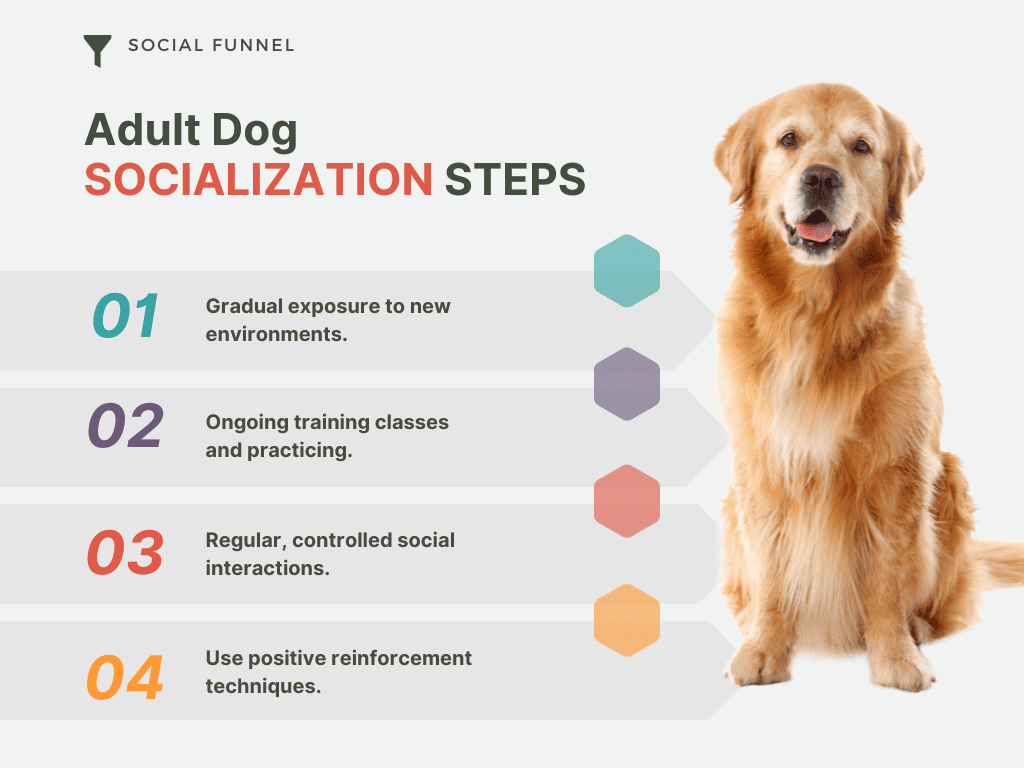
For adult Golden Retrievers, the focus shifts to building upon or establishing foundational social skills.
This stage might require more patience and specific strategies, especially if the dog missed early socialization opportunities.
- Patience is Key: Adult dogs typically take more time to adapt to new experiences and environments. It’s important to be patient and understanding of their pace.
- Re-Socialization: If an adult dog hasn’t been properly socialized as a puppy, they might need a phase of re-socialization. Start with gradual exposure to new situations and build up as they become more comfortable.
- Consistent Encouragement: Using positive reinforcement techniques is vital in making new experiences enjoyable for adult dogs. Regular rewards like treats, praise, and affection can significantly aid in their socialization process.
By recognizing and adapting to the unique socialization needs of puppies and adult Golden Retrievers, you can ensure a smooth and successful socialization process.
This tailored approach helps in nurturing a well-balanced, sociable, and happy dog throughout their life stages.
Socializing Tips for Golden Retrievers: Other Dogs
Navigating the dynamics of dog-to-dog interactions is a vital component of socializing tips for Golden Retrievers.
It’s about teaching them the art of canine communication and ensuring they know how to play and interact in a friendly, respectful manner.
Let’s explore how to facilitate positive doggy introductions and manage their interactions effectively.
Introduction Strategies for Successful Socializing
The initial introduction between your Golden Retriever and other dogs sets the tone for future interactions. Careful planning and execution are key.
- Choose Calm Environments: Begin in a neutral and quiet setting to minimize territorial feelings. This reduces stress and allows both dogs to interact without feeling defensive or anxious.
- Keep Initial Interactions Short: Short, positive meetings can prevent dogs from becoming overstimulated or overwhelmed, making the experience more enjoyable for both.
- Supervised Meetings: Always be present during these initial meetings. Close supervision ensures safety and allows you to intervene if the interaction takes a negative turn.
Managing Playtime and Interactions Effectively
Proper management of playtime is crucial in the socializing process for Golden Retrievers. It ensures that these interactions remain positive and beneficial.
- Match Play Styles: Aim to pair your Golden Retriever with other dogs that have a similar play style and energy level. This compatibility can lead to more harmonious and enjoyable playtimes.
- Watch for Overexcitement: Golden Retrievers are known for their enthusiasm. Monitoring their excitement levels and providing breaks can prevent them from becoming overly aroused, which could lead to rough play or misunderstandings with other dogs.
- Reinforce Good Behavior: Use positive reinforcement like praise and treats to encourage and reward your Golden Retriever for calm and friendly interactions. This reinforces good social habits.
Recognizing Signs of Positive and Negative Interactions
Understanding and interpreting your Golden Retriever’s body language during interactions with other dogs is a critical part of their socialization journey.
- Positive Signs: Relaxed body language, playful bows, and a wagging tail are indicators of a comfortable and happy dog. These signs show that your Golden Retriever is enjoying the interaction and is feeling sociable.
- Negative Signs: Look out for warning signs like growling, stiffening of the body, or excessive barking. These behaviors suggest discomfort or agitation. It’s crucial to intervene calmly and remove your dog from the situation if these signs appear.
Incorporating these socializing tips for Golden Retrievers into their daily routine will help them learn the nuances of interacting with other dogs, leading to a more sociable, well-adjusted canine companion.
Socializing Tips for Golden Retrievers: People
Socializing your Golden Retriever with people is as crucial as their interaction with other dogs.
It’s about helping them become comfortable and well-behaved around different types of people, including children, strangers, and guests.
Here’s how you can guide your Golden Retriever to be sociable and friendly with people.
Gradual Introduction to New People

Introducing your Golden Retriever to new people should be a gradual and positive experience.
- Start in Familiar Settings: Begin introductions in an environment where your dog feels safe and relaxed. This can be at home or a familiar outdoor space.
- Controlled Interactions: Initially, keep interactions short and positive. Use a leash if necessary to manage their excitement and to ensure safety.
- Use Positive Reinforcement: Reward your dog for calm and polite behavior during introductions. Treats, praise, and petting can reinforce good behavior.
Handling Different Types of Interactions
Golden Retrievers will encounter various people, and each interaction requires a slightly different approach.
- Interacting with Children: Supervise interactions with children closely. Teach both the dog and the child appropriate ways to interact, like gentle petting and avoiding rough play.
- Meeting Strangers: When introducing your dog to strangers, observe your dog’s body language. Encourage friendly behavior but don’t force interactions if your dog seems uncomfortable.
- Dealing with Guests: Train your Golden Retriever to greet guests calmly. Having a specific routine or place for your dog to go when guests arrive can help manage their excitement.
Socializing with people is a key aspect of your Golden Retriever’s development.
It helps them become confident and well-mannered members of the community, capable of handling a variety of social situations with ease.
Socializing Tips for Golden Retrievers: Public Places
Taking your Golden Retriever into public spaces is a significant part of their socialization journey. It exposes them to a variety of scenarios and environments, from bustling city streets to tranquil parks.
Preparing adequately for these outings and knowing how to manage new environments are key steps in ensuring these experiences are positive and beneficial for your dog.
Preparing for Public Outings
Proper preparation can make the difference between a stressful outing and a successful one.
- Start with Short Trips: Begin with brief visits to less crowded places. This helps your dog get used to being out without becoming overwhelmed.
- Carry Essentials: Bring along water, a bowl, treats, and waste bags. Being prepared for basic needs makes the outing more comfortable for both you and your dog.
- Identification and Safety: Ensure your Golden Retriever is wearing a collar with an ID tag and is microchipped. Safety is paramount, especially in unfamiliar environments.
Tips for Managing New Environments
Each new environment presents its own set of challenges and learning opportunities.
- Parks and Natural Settings: These are great for initial public outings. Keep your dog on a leash and gradually introduce them to different areas of the park. Monitor their reactions to new stimuli like birds, squirrels, and other natural elements.
- Urban Areas and Busy Streets: Once your dog is comfortable in quieter settings, you can gradually introduce them to urban environments. Short walks on busy streets expose them to different sounds and sights, like traffic, crowds, and city noises.
- Consistent Commands and Control: Maintain control and use consistent commands during outings. This reinforces good behavior and ensures your dog knows how to respond in different situations.
- Observing and Reacting to Your Dog’s Comfort Level: Pay close attention to your dog’s body language. If they seem stressed or anxious, give them a break and try a quieter setting. It’s important to build positive experiences gradually.
Socialization in public places is an ongoing process. It’s about gradually expanding your Golden Retriever’s comfort zone and helping them navigate the world confidently.
With patience and consistent practice, your Golden Retriever can become a well-adjusted and sociable companion in any setting.
Addressing Behavioral Challenges with Socializing Tips for Golden Retrievers
Golden Retrievers, like all dogs, can exhibit a range of behavioral challenges, including overexcitement, shyness, and fearfulness.
Addressing these behaviors effectively is a crucial part of their socialization and overall well-being.
Here are some strategies to help manage these challenges.
Overexcitement: Calming Techniques
Overexcitement can lead to jumping, barking, and unruly behavior. Here’s how to gently bring your Golden Retriever to a calmer state:
- Routine Exercise: Regular exercise helps burn off excess energy, making your dog calmer.
- Training Commands: Teach commands like ‘sit’ or ‘stay’ to encourage calm behavior. Use these commands in situations where your dog tends to get overexcited.
- Controlled Greetings: Train your dog to greet people and other animals calmly. Use a leash during greetings and reward calm behavior.
Shyness: Building Confidence
A shy Golden Retriever may hesitate to interact with people or other dogs. These tips can help build confidence:
- Positive Social Experiences: Gradually expose your shy dog to new situations. Ensure these experiences are positive and non-threatening.
- Safe Spaces: Provide a safe space at home where your dog can retreat if they feel overwhelmed.
- Reward-Based Training: Use treats and praises to reward small steps taken towards being more sociable.
Fearfulness: Overcoming Fears
Fearfulness in dogs can manifest as avoidance, hiding, or even aggression. Addressing this requires patience and gentle guidance:
- Identify Triggers: Understand what triggers your dog’s fear and try to minimize exposure to these triggers.
- Desensitization: Gradually expose your dog to their fears in a controlled way. Start with low levels of the fear-inducing stimulus and slowly increase the exposure.
- Positive Reinforcement: Reinforce brave behavior with treats and praises. This helps create a positive association with the previously feared situation.
By understanding and addressing these behavioral challenges, you can help your Golden Retriever become more balanced and confident.
Socializing Tips for Golden Retrievers: Training Techniques
Training your Golden Retriever using the right techniques is essential for successful socialization and overall behavior management.
Positive Reinforcement Methods
Positive reinforcement is a powerful tool in dog training, especially for Golden Retrievers known for their eagerness to please.
- Rewards-Based System: Utilize treats, praise, and affection as rewards for good behavior. This approach encourages your dog to repeat the desired behavior.
- Clicker Training: A clicker can be used to mark the exact moment your dog performs the correct action, followed by a reward. This method helps in precise behavior shaping.
- Avoiding Negative Reinforcement: Focus on reinforcing what you want your dog to do, rather than punishing undesirable behaviors. This creates a more positive learning environment.
Socialization Exercises and Games
Engaging your Golden Retriever in socialization exercises and games can be both fun and educational.
- Play Dates: Arrange play dates with other dogs. This helps your Golden Retriever practice social skills in a controlled and safe environment.
- Group Training Classes: Participate in group training classes. They provide a structured environment for your dog to interact with others while learning.
- Interactive Games: Games like fetch, hide-and-seek, and obstacle courses can be excellent for socializing. They encourage interaction with different people and environments.
The Importance of Consistency and Patience
Consistency and patience are key components of successful dog training.
- Regular Practice: Consistent training and socialization help reinforce learned behaviors. Make training a regular part of your routine.
- Patience is Crucial: Understand that progress can be slow. Be patient with your Golden Retriever and recognize that each small step forward is an achievement.
- Adapting to Your Dog’s Pace: Every dog learns at their own pace. Tailor your training approach to suit your dog’s learning style and comfort level.
By incorporating these training techniques, you can significantly enhance your Golden Retriever’s socialization skills and overall behavior.
Remember, the goal is to build a strong, trusting relationship with your dog through positive and consistent training practices.
Socializing Tips for Golden Retrievers: Health and Safety Tips

Ensuring the health and safety of your Golden Retriever is paramount, especially when it comes to socialization.
Vaccination and Health Check-Ups
Regular veterinary care is crucial for a healthy, social Golden Retriever.
- Stay Up-to-Date with Vaccinations: Ensure your Golden Retriever is up-to-date with all necessary vaccinations. This is especially important before exposing them to other dogs and public places.
- Regular Health Check-Ups: Schedule regular check-ups with your vet. These visits can help catch any health issues early and ensure your dog is fit for socialization activities.
- Parasite Control: Stay on top of flea, tick, and worm control. This protects not only your dog but also other animals and people they interact with.
Leash Training and Safety
Proper leash training is essential for the safety and control of your Golden Retriever in public spaces.
- Start Leash Training Early: Familiarize your puppy with a leash as early as possible. Begin with short, positive sessions in a familiar environment.
- Maintain Control: Always keep your dog on a leash in public areas unless in a designated off-leash area. This ensures you have control over your dog in various situations.
- Choose the Right Gear: Use a sturdy, comfortable leash and collar or harness. The right gear can prevent injuries and provide better control during walks.
Reading a Dog’s Body Language
Understanding your Golden Retriever’s body language is key to ensuring their well-being and safety during social interactions.
- Recognize Signs of Comfort and Stress: Learn to differentiate between relaxed and stressed body language. Signs of stress might include excessive panting, tucked tail, or pinned ears.
- Respond to Their Cues: If your dog shows signs of discomfort or fear, it’s important to respond appropriately. This might mean removing them from a stressful situation or giving them space.
- Encourage Positive Interactions: Positive body language like a wagging tail, relaxed posture, and playful behavior should be encouraged. Recognizing and reinforcing these behaviors can lead to more enjoyable social experiences.
By focusing on these health and safety aspects, you can create a safe and positive environment for socializing your Golden Retriever.
This not only benefits their physical and mental well-being but also ensures a more pleasant socialization experience for everyone involved.
Resources for Further Learning about Socializing Tips for Golden Retrievers
Continuing your education on socializing Golden Retrievers is crucial for providing the best care and training for your furry companion.
Here are some recommended resources that can offer additional insights and guidance. Remember, the journey of learning is continuous, and these resources can be valuable tools in your journey.
Recommended Books, Websites, and Local Classes
- Books: Look for books authored by renowned dog trainers and behaviorists. Titles focusing on dog psychology, training techniques, and breed-specific characteristics can be particularly helpful. Books like “The Other End of the Leash” by Patricia McConnell or “How to Raise the Perfect Dog” by Cesar Millan can offer valuable insights.
- Websites: Trusted websites can provide a wealth of information. Look for sites with contributions from veterinarians or certified dog trainers. Websites like the American Kennel Club (AKC) or The Golden Retriever Club of America offer breed-specific advice and general dog care tips.
- Local Classes: Enrolling in local dog training classes or socialization groups can be beneficial. These classes provide practical, hands-on experience under the guidance of professionals. They also offer the opportunity for your dog to interact with others in a controlled environment.
Finding Reliable Socializing Tips for Golden Retrievers
- Check Qualifications: When reading books or websites, check the qualifications and experience of the authors or contributors. Look for individuals with recognized certifications in dog training or veterinary medicine.
- Seek Recommendations: Ask your veterinarian or local dog owners for recommendations on books, websites, and classes. Personal endorsements can often lead you to the best resources.
- Review and Compare: Don’t rely on a single source for information. Review multiple resources and compare the advice given. This can help you form a well-rounded understanding of how to best socialize your Golden Retriever.
- Stay Updated: Dog training techniques and theories can evolve. Stay updated with the latest information and be open to new methods and ideas.
These resources can greatly assist you in the ongoing process of socializing your Golden Retriever. They not only provide additional knowledge but also offer different perspectives and approaches to dog training and socialization.
Wrapping Up Socializing Tips for Golden Retrievers
In summary, mastering the art of socializing your Golden Retriever requires patience, understanding, and consistent effort.
By following the tips and strategies outlined in this guide, from understanding their unique traits to navigating public spaces and deciphering dog body language, you can help your furry friend develop into a well-rounded and sociable companion.
Remember, each Golden Retriever is unique, and tailoring your approach to their individual needs will yield the best results. Keep learning, stay patient, and enjoy the rewarding journey of building a strong, loving bond with your Golden Retriever.
-

Coffee Mug – In Dog Coffees I’ve Only Had One
Price range: $11.95 through $14.95 Select options This product has multiple variants. The options may be chosen on the product page
